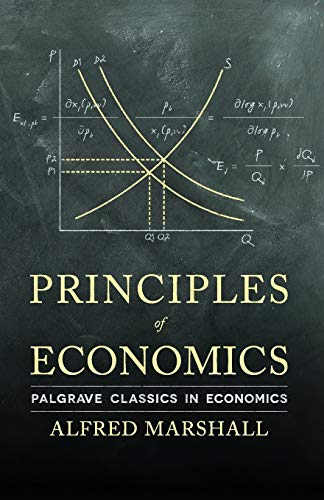Items related to Principles of Economics (Palgrave Classics in Economics)

"synopsis" may belong to another edition of this title.
"It is impossible to understand economics in the twentieth century without knowing about Marshall's Principles. The simplicity of his presentation conceals complexities that were not apparent to later generations who picked up on the mathematics whilst ignoring many of the evolutionary ideas that fascinate modern scholars."
Roger E. Backhouse, Professor of the History and Philosophy of Economics, University of Birmingham, UK
"Alfred Marshall's Principles of Economics is an outstanding contribution, one of the foundations of neoclassical economics, and shaped the thought of economists from John Maynard Keynes to Milton Friedman. Every modern economist should make its acquaintaince and should look in admiration at that seminal diagram in which Marshall drew a supply curve intersecting a demand curve. Peter Groenewegen, Marshall's biographer and the greatest living Marshall scholar, has written a new introduction for this edition, drawing on a lifetime of insightful scholarship."
Robert W. Dimand, Professor of Economics, Brock University, Canada
Alfred Marshall, Principles of Economics (1890) – Founder of modern (Neo-classical) Economics. His book 'Principles of Economics' is considered to be his seminal work.
"About this title" may belong to another edition of this title.
- PublisherPalgrave Macmillan
- Publication date2013
- ISBN 10 0230249299
- ISBN 13 9780230249295
- BindingPaperback
- Number of pages759
- Rating
Buy New
Learn more about this copy
Shipping:
£ 2.11
Within U.S.A.
Top Search Results from the AbeBooks Marketplace
Principles of Economics
Book Description Condition: New. Seller Inventory # 19956652-n
Principles of Economics (Palgrave Classics in Economics)
Book Description Condition: New. Book is in NEW condition. Seller Inventory # 0230249299-2-1
Principles of Economics (Palgrave Classics in Economics)
Book Description Condition: New. New! This book is in the same immaculate condition as when it was published. Seller Inventory # 353-0230249299-new
Principles of Economics (Palgrave Classics in Economics) by Marshall, A. [Paperback ]
Book Description Soft Cover. Condition: new. Seller Inventory # 9780230249295
PRINCIPLES OF ECONOMICS (PB 2013)
Book Description Condition: Brand New. New. US edition. Expediting shipping for all USA and Europe orders excluding PO Box. Excellent Customer Service. Seller Inventory # ABEOCT23-373830
Principles of Economics
Book Description Paperback / softback. Condition: New. This item is printed on demand. New copy - Usually dispatched within 5-9 working days. Seller Inventory # C9780230249295
Principles of Economics (Paperback or Softback)
Book Description Paperback or Softback. Condition: New. Principles of Economics 2.06. Book. Seller Inventory # BBS-9780230249295
Principles of Economics (Palgrave Classics in Economics)
Book Description Condition: New. Seller Inventory # ABLIING23Feb2215580070445
Principles of Economics (Palgrave Classics in Economics)
Book Description Condition: New. In. Seller Inventory # ria9780230249295_new
Principles of Economics
Print on DemandBook Description Condition: New. PRINT ON DEMAND Book; New; Fast Shipping from the UK. No. book. Seller Inventory # ria9780230249295_lsuk

